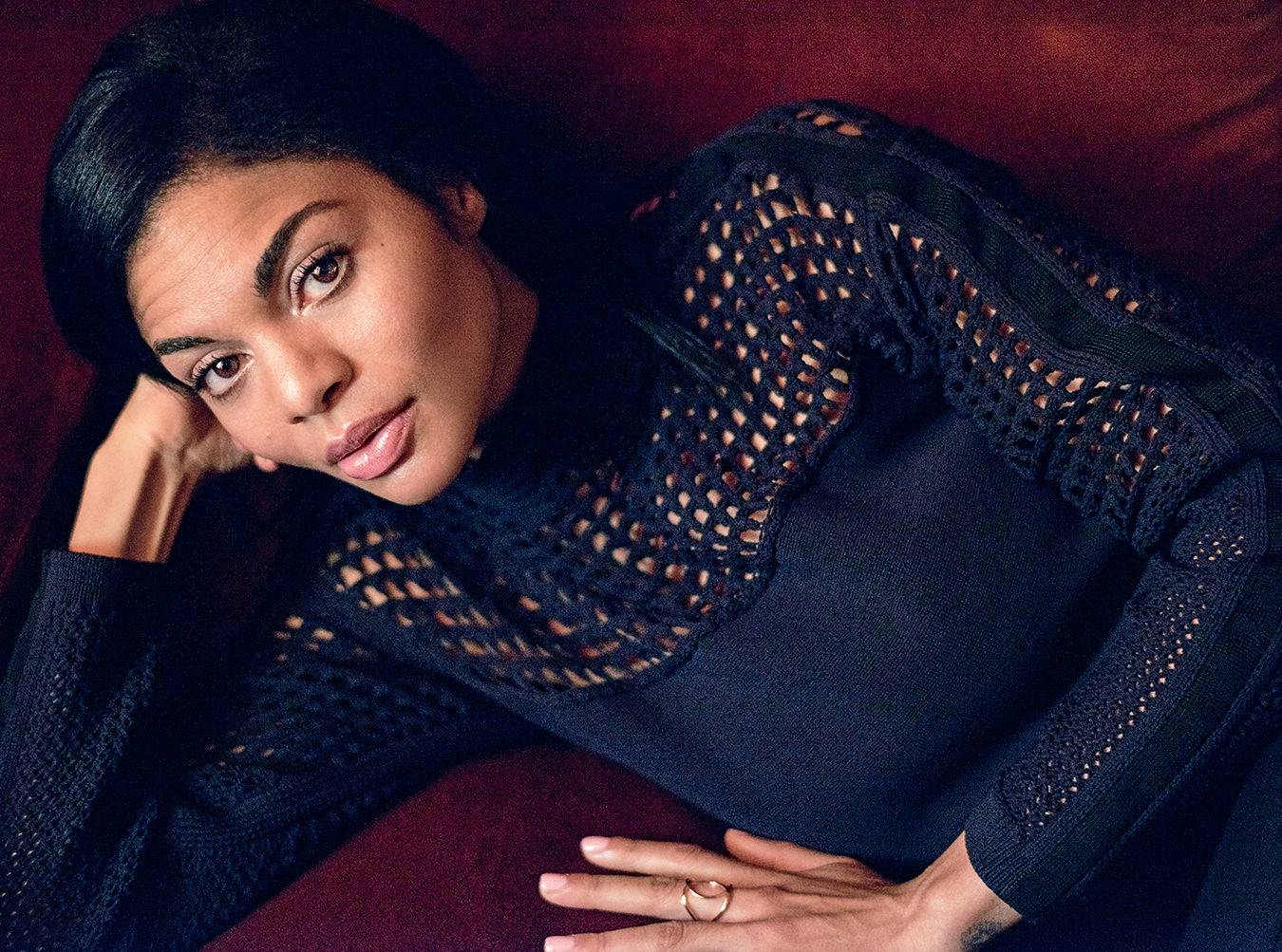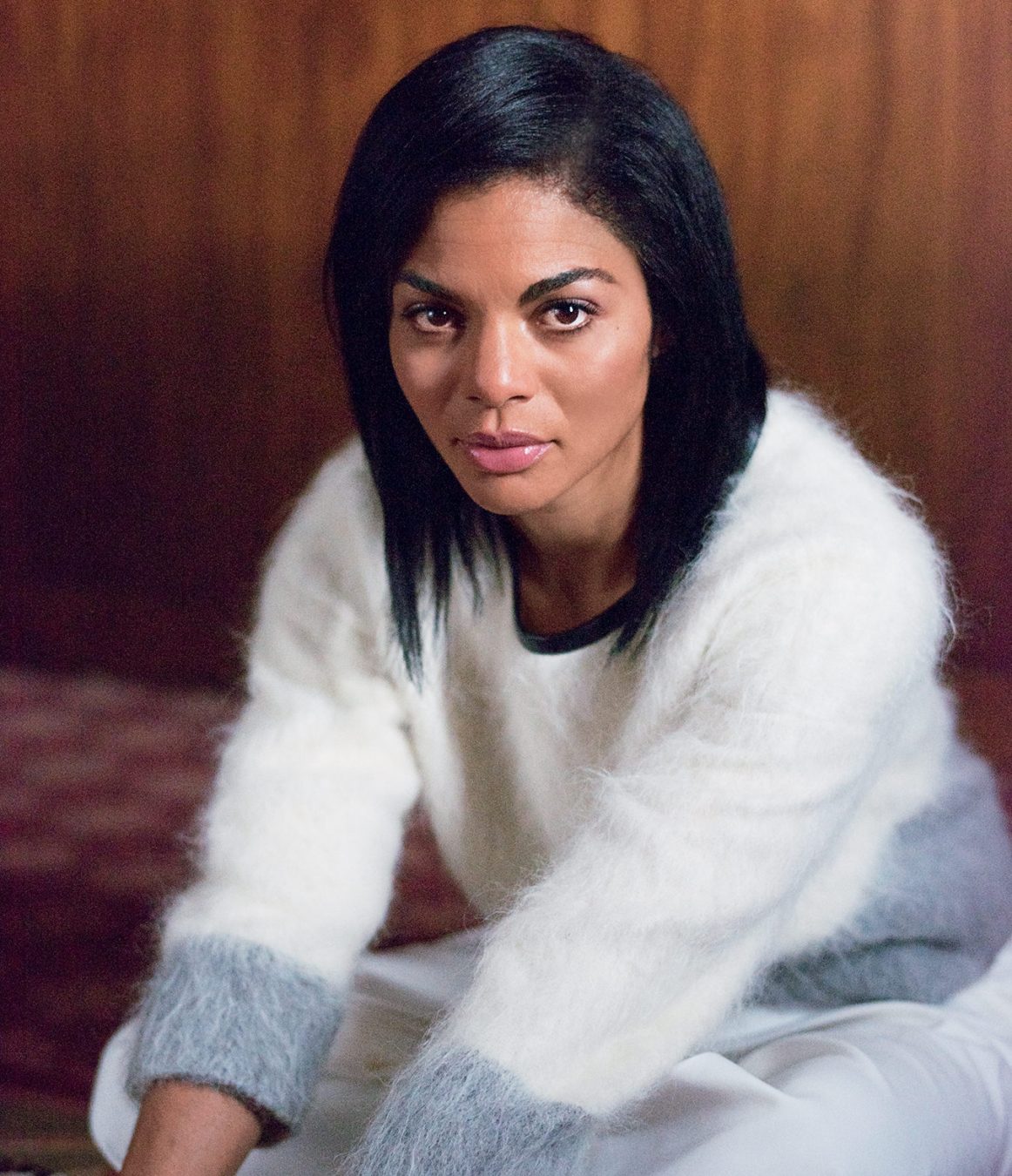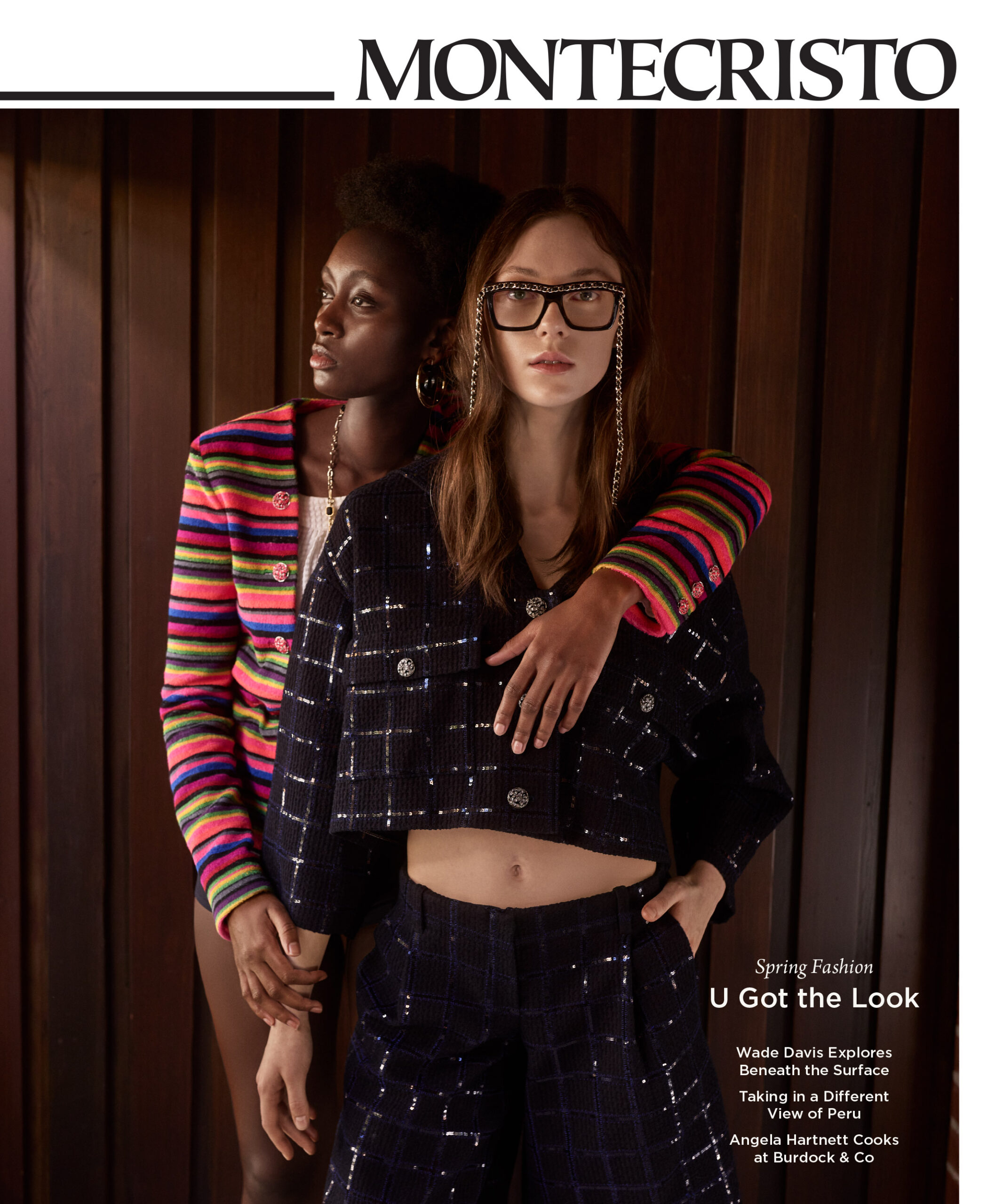The view west from the Roof, the Fairmont Hotel Vancouver’s 15th floor restaurant, shows low clouds bruised blue from a recently spent storm. Then, in walks Ndidi Onukwulu, a waif in leather jacket, with hair slicked back and pedicured pink toes peeking out from flat sandals. Settling into a chair with a cracked leather seat, Onukwulu negotiates a pared-down spinach salad with the waiter—no cheese (she has food sensitivities) but sure, egg is fine.
Unexpectedly, the sun breaks through the clouds, alighting on Onukwulu’s face, turning her huge dark brown eyes amber. She blinks and maneuvers into shade, changes her mind, and turns back to the light. Illumination can be painful, but sometimes one should embrace it. For some, like Onukwulu, pain is a muse, giving rise to metamorphosis—even redemption.
Onukwulu’s fourth album, Dark Swing, released this past October under the Universal Music Canada label, is a journey through black into light. Written during an especially painful breakup, Onukwulu, known professionally simply as Ndidi, autopsies one year of heartache and regret. Any survivor of love lost is reminded of their own desolation while listening to one particularly haunting track, “Don’t Come Around Here”: “Thoughts of you bring a hurt again/The ghost of your scent lingers in my skin/Numbness, blindness, sour.” The pain is soothed by Onukwulu’s chocolate timbres and spicy-sweet runs that bound effortlessly from octave to octave. Onukwulu may take you to dark places, but, damn, it hurts so good. For Onukwulu, however, the breakup is still so raw, “I can’t play the song live”.
Today, Onukwulu is fighting jetlag, her internal clock still adjusting following a tour of France and Germany. Continental Europe has become one of her musical stomping grounds, and she is delighted with how French and German audiences have embraced her work. The French? “Very kind and attentive.” German music lovers, meanwhile, “are amazing. They are very appreciative of music and open to anything. They dance and move and it’s very lively”. The only disconnect she has found with her European audiences is that “people think I’m American. They don’t think there are people like me here in Canada,” says Onukwulu, who is of German and Nigerian descent.
“There are so many brilliant Canadians doing so much good on this planet—quietly—and that’s something to be soulful about.”
The assumption by Europeans that a black singer, whose work embodies an eclectic fusion of jazz, R&B, blues, pop, rock, and country, must be American frustrates Onukwulu. It’s understandable, though, she admits. In keeping with Canada’s generally low international profile, our diversity of talented musicians often goes unheralded on the world stage, Onukwulu says.
A 2009 Juno Award nominee for Best Solo Roots & Traditional Album of the Year for The Contradictor, Onukwulu isn’t reticent about trumpeting Canadian talent. Our musicians rival those in United States—even in genres like soul, she says. Born in the American Deep South, soul—a fusion of gospel, jazz and R&B—provided a platform for such powerhouses as Aretha Franklin, Patti Labelle, and Whitney Houston. Britain’s Amy Winehouse later showed how soul has transcended national boundaries and racial backgrounds. Canadians, says Onukwulu, have their own brand of soul, one embodying a “power and earthiness” that speaks to our connection to rugged landscapes and dramatic seasons. “We have this beautiful land and we have freedom and kindness,” Onukwulu says. “There are so many brilliant Canadians doing so much good on this planet—quietly—and that’s something to be soulful about.”
This made-in-Canada soul sound is emerging thanks in part to singers like Frazey Ford, co-founder of the Be Good Tanyas, who released a solo soul-folk album in 2010 titled Obadiah, says Onukwulu. She dives into similar musical waters: “I’m essentially a soul singer. It’s the timbre of my voice, and a sensitivity. I hope that more singers—male and female of different ethnicities and different origins that aren’t easily identifiable—come forward and bring that fire and passion and create soul music—Canadian soul.”
The struggles against racial strife in Deep South America fed soul music. For Onukwulu, the seeds of soul were sown in early hardships growing up in the sawmill and logging towns of Burns Lake and Golden in British Columbia. “I grew up under difficult circumstances; I didn’t have a pleasant childhood,” she says. “My mother wasn’t well; my father was absent. Although “very blessed to have an amazing foster family,” she recalls stretches of loneliness and isolation, which she filled by wandering through the wilderness surrounding her home. “I connected to the trees and the ground and the bugs—these were my friends. That’s what I had—the universe—I knew it would protect me no matter what.”
“I let the voice be free, so the real soul and emotion could filter through. There was a lot of space—it felt effortless.”
Pain wrought in the early years can follow an individual into adulthood. The heartrending breakup that inspired Dark Swing was due in part to Onukwulu’s propensity for picking the bad boy, something she links to alcohol abuse. “I used to make piss-poor romantic decisions because I was intoxicated,” says Onukwulu, spearing at the leaves of her spinach salad. “I was a big disaster and doing things to hurt myself continuously. When I made this record, I was coming out of some bad, bad stuff. That song, “Don’t Come Around Here”, was about one of those bad decisions—you want to escape this person but you just keep being drawn in. And you know it will eventually kill you. So, not only was it about another person but also about my love for substances at the same time—booze was my lover for a very long time.”
It is perhaps a remarkable confession to make. But when you emerge from Dante’s circles of hell bloodied and bruised but ecstatically alive, sometimes you want to shout from the rooftops. “Being sober is amazing and I’m really grateful for it,” says Onukwulu. A clear head often leads to fruitful new relationships in all aspects of your life. Onukwulu happily reports that she’s in a healthy and loving personal relationship. And her professional connections are creative and inspiring. Dark Swing was made in collaboration with Los Angeles music producer and guitarist Joel Shearer, who has worked with Alanis Morissette, Dido, and Damien Rice. Shearer helped Onukwulu tamp down the intensity and raw power of previous albums, leading to “moments where I let the voice be free, so the real soul and emotion could filter through. There was a lot of space—it felt effortless”. And fearless, too, with Onukwulu orchestrating a collage of musical styles. On several tracks, the jazz and blues undertones take a back seat to country: “Sit Down”, as well as the booty shaking “Why Can’t You Be Mine”. There’s nothing country likes better than a tale about a strong woman saying good riddance to a weak man, and Onukwulu nails it with both songs.
In the meantime, Onukwulu is nailing down dates for a western Canada tour on the summer music festival circuit starting in June, and finessing the details for another trip through the clubs of Europe in a few months. “My passion is playing live—I love it,” she says. During those times when she’s not on the road, Onukwulu will be in Los Angeles, working on an album as singer/songwriter in collaboration with Canadian-American Mischa Chillak for their group, Boga. “It’s still really soulful but has very different soundscapes; I’m pretty excited about it,” Onukwulu says.
Onukwulu’s journey towards the light isn’t at its end; in fact, it’s just getting started. And the light will wax and wane, because light is ethereal, wafted by life’s stormy disappointments and failure—both things that make us more human. As Onukwulu knows only too well, the darkness and pain should be embraced with as much passion as the good, for it stokes the fires of creativity, letting the light emerge once again.
Make-up: Melanie Neufeld for lizbellagency.com.
Hair: Isabelle Cummins for iDaburn Salons.
Shot on location at the Fairmont Hotel Vancouver.












